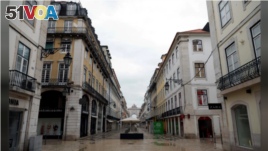23 April 2020
Portugal has increased government efforts to support the country's struggling Roma communities during the coronavirus crisis. But rights groups say more help is needed.
Many families have not been able to earn money since street markets and fairs were closed.

This file photo shows Augusta street during a partial lockdown as part of state of emergency to combat the coronavirus disease (COVID-19) outbreak in Lisbon, Portugal March 30, 2020. (REUTERS/Rafael Marchante)
Portugal citizens have been under stay-at-home orders since March 18 in an effort to slow the spread of the new coronavirus.
The country has about 37,000 people who belong to the minority Roma ethnic community. Many Roma in Portugal – and in other European nations – face discrimination, poverty and social isolation.
Portugal's government recently introduced additional measures for Roma communities after 33 people at a settlement were confirmed to have COVID-19, the disease the virus causes. The settlement in the country's southeastern Alentejo area is home to about 200 people.
After the coronavirus cases were discovered, the settlement was closed off and carefully cleaned. Local officials then took food and medicine to the people as stay-at-home orders continued.
In the beginning, those in the settlement had to pay for the goods. But Claudia Pereira, Secretary of State for Integration and Migration, told the Reuters news agency that those who are not currently earning any money can now receive goods for free.
Pereira said the government and local officials are also working to provide support to other Roma communities in need across the country. "Some of these communities live in places with no conditions, in tents and camps," she said. "Some don't have access to drinking water."
The lack of government support in the beginning led activist Bruno Goncalves to lead efforts to buy food vouchers for some needy families. Goncalves belongs to the organization Letras Nomadas, which seeks to help Portugal's Roma communities.
Goncalves now fears government support will fail to reach everyone. He said there is "hunger in the community" because of the closures of street markets and gatherings. "Those who lived off selling two or three shirts a day are in a very complicated situation," he said. "These people have no savings."
The government has introduced other measures to help hard-hit families during the coronavirus crisis. These include the temporary suspension of electricity and water shutoffs, as well as financial support for some housing payments.
But Goncalves said many Portuguese Roma, especially older people, find it hard to complete the necessary paperwork to receive government help. This is because there are several steps in the process and some community members cannot read.
Goncalves added, "The Roma are not counted. We are often forgotten."
I'm Bryan Lynn.
Reuters reported on this story. Bryan Lynn adapted the report for VOA Learning English. Ashley Thompson was the editor.
We want to hear from you. Write to us in the Comments section, and visit 51VOA.COM.
________________________________________________________________
Words in This Story
fair – n. a gathering of buyers and sellers at a particular place and time for trade
isolation – n. the state of being separate from other people, places or things
access – n. a way of getting near, at, or to something or someone
voucher – v. a piece of paper that can be used to pay for goods or services
complicated – adj. involving a lot of different parts, in a way that is difficult to understand